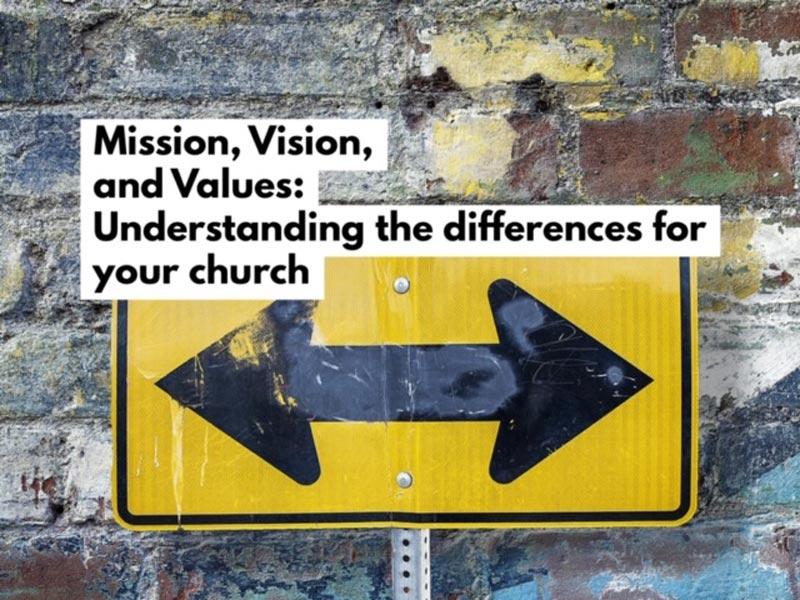
Sometimes used interchangeably, and sometimes not used at all, Mission, Vision, and Values are 3 pieces of a puzzle that make up who you are as a church, but in order to have, give and live out a complete picture of who you are as a church (and attract the people that feel connected to be part of who you are) you’ll need to get clear on these 3 distinct pieces.
I’ve helped churches and organizations in both US and Canada get clear on their Mission, Vision and Values, and here’s what I’ve learned:
Mission:
A mission statement is about WHAT you do.
I would argue that the mission of every church is the Great Commission.
Is a mission statement for your church important?
Yes, and it was so important that Jesus, the founder of the church, created it for us:
Matthew 28:18
18 And Jesus came and spoke to them, saying, “All authority has been given to Me in heaven and on earth. 19 Go therefore and make disciples of all the nations, baptizing them in the name of the Father and of the Son and of the Holy Spirit, 20 teaching them to observe all things that I have commanded you…
Our mission as The Church is to make disciples, and your mission at your church is to make disciples.
Vision:
Vision is about HOW you’re going to fulfill the mission.
We’re all members of the body of Christ, some the hand, some the ear, some the eye. You don’t need to be all of the members of the body. Your responsibility is to discover your unique role, live that out and as part of The Church, and then together, we’ll be fulfilling the Great Commission.
Is a vision statement important?
Yes. It’s a key way to understand how you’re going to live out the Great Commission. Factors like your target audience (yep, insert pushback here, but first read this post about target audiences), your geographical location, the culture you’re in, the language and traditions of the people in the area of your church, and your style of church – meaning music, preaching, how you do community, etc.
Not all of these things need to be reflected in your vision statement, (I’ve ready many that are much too long) but something that could appear on a business card or under the logo on your sign – though this isn’t always the place for them, they should boil down to that level of simplicity.
Something like “Meeting together to meet Jesus” or “Growing together in Community” or “Discovering each person’s gift. Reaching our potential together” or “Making a difference in your world and our world” or “Small churches. Big impact” or “Connecting cowboys when they’re away from home.” (honestly, this was a church in Dallas that specifically travels to Rodeos and holds church services while cowboys are visiting from out of town, and I love it!)
Each of these example vision statements gives a perspective on what you’re about, and paints a broad enough picture that they can see how it may apply to a small group, weekend service, prayer meeting or kids classroom.
Vision statements are an easy-to-remember idea that gives direction to your unique way of accomplishing the great commission.
Values:
Values are about WHO you are and WHY you do what you do.
We all have a shared mission of the great commission, and many churches know other churches with similar vision statements, but what makes you really unique is who you are – defined and described by your values.
Think about the person you married. You didn’t feel connected to them because of what they did, but because of who they are. The same is true when people are exploring the idea of being part of your church – like the dating process, new people are trying to figure out who you are and if they want to be connected.
Values have a hierarchy – we might all agree to dozens of things we value – like love, honesty, integrity, friendships, family, worship, faith, independence, stability – you get the idea, but what really defines who you are are you core values – the top 3-5 values that are the filter for your decisions, because every decision is a reflection of what you value.
Patrick Lencioni wrote a valuable book called “The Advantage” (click here to check it out on Amazon) which walks through the process of helping an organization (business or church) establish their values, along with 5 other essential questions that need to be answered to succeed.
You’re not really deciding your core values, but rather discovering the values that already exist, and giving the people you delegate decisions to the opportunity to use those values to make better informed decisions.
The Trap of Too Many Values:
Too often, organizations don’t want to rule out a value – as if not including it in their “core values” means they don’t actually value something, but the understanding of the values hierarchy allows us to say “Yes, we value other things, but when we need to make a decision, here are the 3 or 4 filters we’re going to use.”
Discover your 3 or 4 core values, and make them clear internally so that delegated decisions, and discussions that need to be had to make decisions can be filtered through those values. (Could we do X, or Y with that budget? Since we value X, let’s use the budget to reflect that.)
“What We Believe” is not the same as Core Values:
A common confusion happens when people mistake beliefs for core values (just do a google search for church core values and you’ll see what I mean). I’ve found a list of 15 Biblical beliefs, one that included “tenets of faith”, and another that included the church’s bylaws.
The biblical beliefs that you hold will inform how you live out your values (ie. as a church, we may live out the value of “love” differently than an organization that doesn’t use a biblical world view) and recognize that your beliefs inform how you live out your values, but they are likely not unique to your church, in the way that the combination of Mission, Vision, and Values will be.
Wow, now what? How do we figure out our church’s Mission, Vision, and Values?
 I’ve had the honor of working with churches and businesses to help them discover and live our their vision, and values.
I’ve had the honor of working with churches and businesses to help them discover and live our their vision, and values.
Many churches don’t just need to discover their values, but also may need to do a reset on lengthy mission statements, core value lists and re-establish what they’re vision is, then communicate that to their church.
The interesting part is that it’s different every time I meet with an organization. I don’t bring answers to the table, as much as I bring questions and guide the discussion. It’s a unique process every time.
This in-person process takes 2-3 days with an organizations key leaders, where you’ll walk away clear on your mission, vision, values and how to start communicating and living them out as a team.
If you’re interested in more details about having me meet with your team to create this clarity, send me an email: adam@adammclaughlin.net with the subject “Help with our Mission, vision and values” – we’ll start the conversation and find out if we might be a fit to work together.